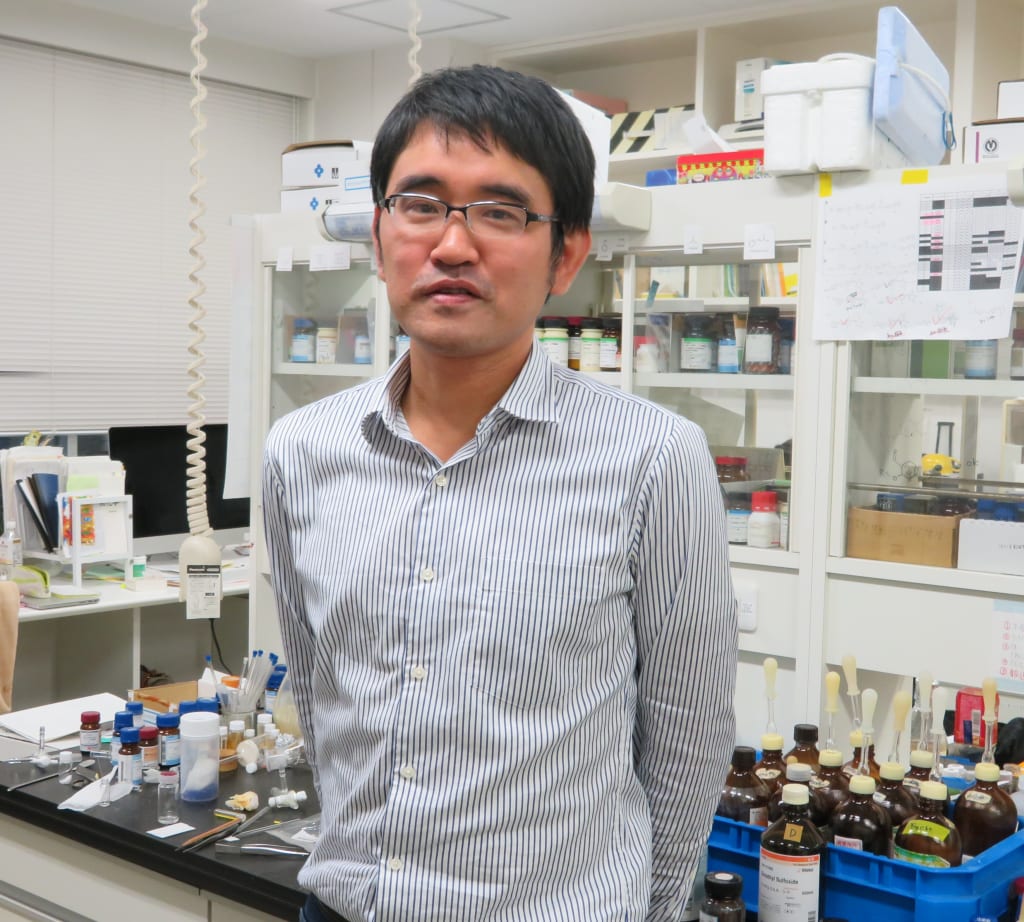- someone
- Information for Middle and High School Researchers
- Research Tips
Let's go meet a researcher - Mr. Yuta Fujikawa, Tokyo University of Pharmacy and Life Sciences
2019.02.24
Cancer cells can be visualized by using chemicals to illuminate the function of proteins that are abundant in cancer cells. Yuta Fujikawa, a scientist in the Laboratory of Molecular Biochemistry at Tokyo University of Pharmacy and Life Sciences, is trying to elucidate the mechanisms of life through the power of chemistry.
This is apparently how Mr. Fujikawa became a researcher: "I want to know what I don't know.
The world is full of things we don't understand!
It all started with a TV program.
Mr. Fujikawa became aware that he wanted to become a researcher when he saw a TV special on immunology when he was in high school.
Mr. Fujikawa: "At that time, I was also learning about immunology in school, but the world's research was much more advanced than the textbooks. Even so, I was shocked to learn that there were still many things that remained unexplained.
Wanting to learn more about immunology, Mr. Fujikawa went to a university with a pharmacy department. As a university student, he decided early on that he wanted to try his hand at experimentation.
There, I applied for a part-time job as a research assistant that was advertised by a laboratory in the medical department of the same university, and was exposed to experimental operations from the time I was an undergraduate student.
Meet people and expand your world.
We thought, "Maybe we can find excitement that we haven't seen yet. We thought that maybe it could be out there."
When choosing a graduate school, Mr. Fujikawa wondered whether to stay in the laboratory at his university or go to another graduate school.
Because of his original personality of liking to meet people and hear about things he did not know, he visited many laboratories and talked to many professors. When he heard about a professor he met in the process, it just clicked.
Looking back, I didn't understand what the professor said about his research because it was too difficult. But I was attracted by his attitude and passion, and I decided I wanted to do research under him."
In the laboratory where I planned to enter graduate school, we were visualizing molecules in living organisms by creating fluorescent substances.
This is where Mr. Fujikawa's current research began.
Knowing how it works" has revealed unexpected results.
Glutathione - transferase (GST) is present in many cells and functions to remove reactive oxygen species and other substances generated in the body.
On the other hand, Fujikawa's research focuses on GSTP, a type of GST that appears in many cancer cells; GSTP is a GST found in the placenta more than 30 years ago.
This GSTP is still a mystery to me. Why is a protein that is very abundant in the placenta also present in cancer cells? On the other hand, GSTP is not present in all cancers, and in some cancers its expression is rather suppressed. What kind of mechanism is working in vivo? I am very interested in why it is not present in all cancers."
Fujikawa says, "I was wondering if there is a way to make the GSTP react with the fluorescent substance. To answer these questions, he created a fluorescent substance that glows when it is reacted with GSTP. By making this function visible, it became clear that some cancer cells unexpectedly have different levels of activity even within the same cancer cell.
Learn from your mistakes
Research often does not work.
The researcher's intuition that 'this might work' will more often than not be wrong. But just because it didn't work doesn't mean it was a failure. It may seem like we are moving away from the goal, but if we can learn a lot from those failures, I think we will end up getting closer to the goal. In other words, it is okay to fail. I think it is important to think for oneself after failure. This is something we should cherish in our lives as well.
Instead of giving up there because it didn't work out, absorbing and turning it into a learning experience may be the key to success.
(Text by Kotaro Shinjo) (Edited by Hikaru Takamura)
Profile of Yuta Fujikawa
D. from the Graduate School of Pharmaceutical Sciences at the University of Tokyo in 2009. After working as a researcher at the German Cancer Research Center and as an overseas postdoctoral fellow of the Japan Society for the Promotion of Science (JSPS), he assumed his current position in 2012. While engaged in research on the development of fluorescent substances that visualize enzymes present in cancer cells, he is also involved in the search for compounds that can be used as the basis for new drugs under a private university research branding project for which the Tokyo University of Pharmacy and Life Sciences was selected.
